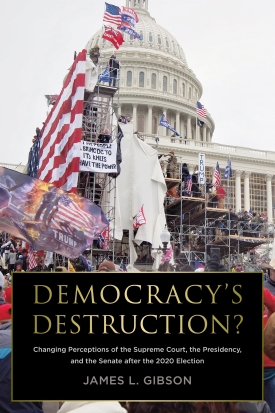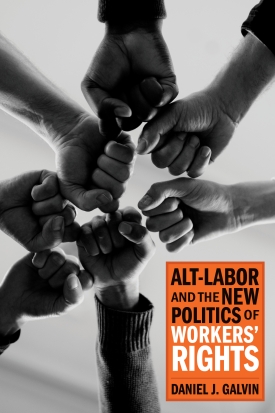Racially restrictive housing covenants – used by white homeowners to prevent migration of people of color into their neighborhoods – contributed to contemporary patterns of residential segregation, social stratification, and inequality. Yet, policy proposals to correct these historical wrongs have not gained broad support. Political scientist Bryant Moy will investigate whether awareness of racially restrictive housing covenants bolsters support for reparations. He will conduct a nationally representative survey experiment for his study.
People of Color (PoC) differ by their time and mode of arrival in the U.S., their contact with institutions, and individual and group experiences with discrimination. This social category aims to capture the collective identity of different low-status groups, as a shared sense of being treated differently than Whites might lead to greater solidarity with other PoC and increase support for policies that benefit other minoritized groups. To what extent does inter-minority solidarity translate into political action?
In August 2022, the Biden Administration announced plans to forgive billions in student loan debt. Proponents of the plans see it as responsible public policy, while critics see it as placing an unfair burden on taxpayers. Political scientist Alessandro Del Ponte and colleagues will examine the factors that are associated with attitudes toward loan forgiveness using a nationally representative survey experiment of 8,000 respondents.
Research on the effectiveness of prejudice reduction techniques has shown mixed results, and rarely explores their effects on policy attitudes. One method of reducing prejudice draws on the psychological theory of perspective-taking, which posits that encouraging individuals to adopt the perspective of out-group members can decrease prejudice towards the group.
The U.S. is undergoing a historic demographic shift as, collectively, Asian, Black, Latino, multiracial, and other people of color are projected to become the numerical majority. To date, most social science research has employed controlled experiments to study the response of non-Hispanic Whites to this projected change. This project will center people of color and take advantage of a natural experiment—the release of new census projections in 2023—to understand the effects of real-world exposure to racial projections on public opinion.

Democracy's Destruction?
About This Book
“James Gibson tackles one of the most pressing issues in contemporary American politics: the health and likely trajectory of our constitutional democracy. His extensive and careful analysis of the 2020 presidential contest, and its aftermath, lead him to a startling conclusion. By and large, Americans’ faith in their political institutions held steady. Scholars, and anyone concerned about the future of our democracy, should read this fascinating book.”
—VINCENT HUTCHINGS, Hanes Walton Jr. Collegiate Professor, Political Science Department and Department of Afro American and African Studies (by courtesy), University of Michigan
“James Gibson advances a cogent analysis showing that our national political institutions remain robust despite efforts to undermine them during and after the 2020 election. Loaded with critical empirical findings and normative implications, Democracy’s Destruction? is a book one will want to keep handy as we sort through future contentious elections and risks to democratic norms and institutions.”
—BRANDON BARTELS, professor of political science, George Washington University
On January 6, 2021, an angry mob stormed the U.S. Capitol in an attempt to overturn the results of the 2020 presidential election. This assault on America’s democratic system was orchestrated by then President Donald Trump, abetted by his political party, and supported by a vocal minority of the American people. Did denial of the election results and the subsequent insurrection inflict damage on American political institutions? While most pundits and many scholars say yes, they have offered little rigorous evidence for this assertion. In Democracy’s Destruction? political scientist James L. Gibson uses surveys from representative samples of the American population to provide a more informed answer to the question.
Focusing on the U.S. Supreme Court, the presidency, and the U.S. Senate, Gibson reveals that how people assessed the election, the insurrection, and even the second Trump impeachment has little connection to their willingness to view American political institutions as legitimate. Instead, legitimacy is grounded in more general commitments to democratic values and support for the rule of law. On most issues of institutional legitimacy, those who denied the election results and supported the insurrection were not more likely to be alienated from political institutions and to consider them illegitimate.
Democracy’s Destruction? offers rigorous analysis of the effect of the Trump insurrection on the state of U.S. democracy today. While cautioning that Trump and many Republicans may be devising schemes to subvert the next presidential election more effectively, the book attests to the remarkable endurance of American political institutions.
JAMES L. GIBSON is Sidney W. Souers Professor of Government at Washington University in St. Louis.
Download
RSF Journal
View Book Series
Sign Up For Our Mailing List
Apply For Funding

Alt-Labor and the New Politics of Workers’ Rights
About This Book
Selected as a 2024 Noteworthy Book in Industrial Relations and Labor Economics Princeton University Industrial Relations Section
"Daniel Galvin offers readers a superbly incisive, empirically eclectic, narratively compelling analysis of the contemporary politics of workers’ rights. Alt-Labor and the New Politics of Workers’ Rights perceptively charts and contextualizes striking shifts in the American political economy that have profoundly altered the experiences of low-wage workers. What’s more is that Galvin brilliantly centers the agency and power of marginalized workers and the organizations that advance their interests in the face of significant and ongoing structural challenges. Scholars of American politics, students, organizers, and anyone who cares about the fate of American workers will find insight and inspiration in Galvin’s skillful description and analyses of the politics of alt-labor."
—JAMILA MICHENER, associate professor of government and public policy and senior associate dean of public engagement, Brooks School of Public Policy, Cornell University
"The relentless decline of U.S. unions in recent decades is both a cause and a consequence of the devolution of the bedrock New Deal–era labor law that institutionalized collective bargaining rights for broad swaths of the nation’s labor force. In this lucid, deeply researched study, Daniel Galvin analyzes the rapid expansion of state and local laws governing minimum wages, paid leave, and other conditions of employment, and exposes the challenges that shift presents for the ‘alt-labor’ groups that are increasingly leading the fight for workers’ rights."
—RUTH MILKMAN, Distinguished Professor of Sociology, School of Labor and Urban Studies and the Graduate Center, City University of New York
"Dan Galvin’s book adds exponentially to the scholarship on worker centers and ‘alt-labor’ and so much more. It masterfully traces the shift from labor law to employment law, the consequential turn toward policy and enforcement at the state and local levels, and the strategic capacity worker centers have had to build to carry it out. It thoughtfully engages the puzzle of how organizations with so little have managed to accomplish so much. Alt-Labor and the New Politics of Workers’ Rights is deeply researched, theoretically rich, full of powerful insight, and beautifully written to boot."
—JANICE FINE, professor, Rutgers School of Management and Labor Relations and Workplace Justice Lab@RU
Over the last half century, two major developments have transformed the nature of workers’ rights and altered the pathways available to low-wage workers to combat their exploitation. First, while national labor law, which regulates unionization and collective bargaining, has grown increasingly ineffective, employment laws establishing minimal workplace standards have proliferated at the state and local levels. Second, as labor unions have declined, a diversity of small, under-resourced nonprofit "alt-labor" groups have emerged in locations across the United States to organize and support marginalized workers. In Alt-Labor and the New Politics of Workers’ Rights, political scientist Daniel J. Galvin draws on rich data and extensive interviews to examine the links between these developments. With nuance and insight, Galvin explains how alt-labor groups are finding creative ways to help their members while navigating the many organizational challenges and structural constraints they face in this new context.
Alt-labor groups have long offered their members services and organizing opportunities to contest their unfair treatment on the job. But many groups have grown frustrated by the limited impact of these traditional strategies and have turned to public policy to scale up their work. They have successfully led campaigns to combat wage theft, raise the minimum wage, improve working conditions, strengthen immigrants’ rights, and more. These successes present something of a puzzle: relative to their larger, wealthier, and better-connected opponents, alt-labor groups are small, poor, and weak. Their members are primarily low-wage immigrant workers and workers of color who are often socially, economically, and politically marginalized. With few exceptions, the groups lack large dues-paying memberships and are dependent on philanthropic foundations and other unpredictable sources of funding. How, given their myriad challenges, have alt-labor groups managed to make gains for their members?
Galvin reveals that alt-labor groups are leveraging their deep roots in local communities, their unique position in the labor movement, and the flexibility of their organizational forms to build their collective power and extend their reach. A growing number of groups have also become more politically engaged and have set out to alter their political environments by cultivating more engaged citizens, influencing candidate selection processes, and expanding government capacities. These efforts seek to enhance alt-labor groups’ probabilities of success in the near term while incrementally shifting the balance of power over the long term.
Alt-Labor and the New Politics of Workers’ Rights comprehensively details alt-labor’s turn to policy and politics, provides compelling insights into the dilemmas the groups now face, and illuminates how their efforts have both invigorated and complicated the American labor movement.
DANIEL J. GALVIN is professor of political science at Northwestern University and faculty fellow at the Institute for Policy Research.
Awards
2024 Noteworthy Book in Industrial Relations and Labor Economics
Princeton University Industrial Relations Section
RSF Journal
View Book Series
Sign Up For Our Mailing List
Apply For Funding
What role does policing play in making and maintaining geographic boundaries that reinforce and exacerbate racial and economic inequality in American cities? Political scientists Hannah Walker, Marcel Roman, Derek Epp, Mike Findley, and Amy Liu will examine the variations in police stops and arrests at the boundaries of geographically adjacent neighborhoods with large racial, ethnic, and income differences.
Pagination
- Previous page
- Page 6
- Next page
